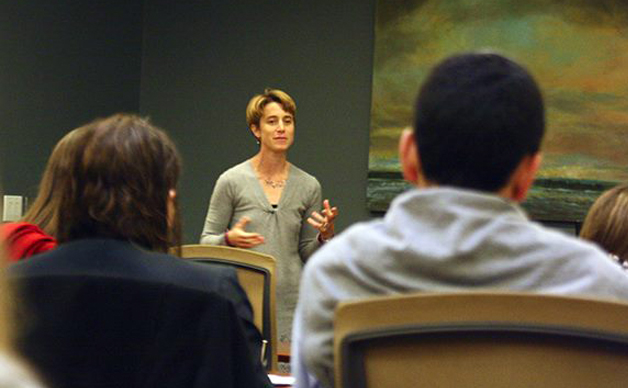International Humanitarian Law Clinic celebrates 10th anniversary

Clinical professor of law and clinic director of Emory¿s International Humanitarian Law Clinic
Emory’s International Humanitarian Law Clinic (IHLC) celebrates ten years in operation during the 2017–2018 academic year. This groundbreaking group works directly with international tribunals, militaries, nongovernment organizations, and other entities to promote the law of war, enforce that law, and train and educate through partnerships.
Laurie Blank, clinical professor of law and clinic director, teaches international humanitarian law and works directly with students on cutting-edge issues in humanitarian law and human rights. In a Q&A she explained the significance that the clinic has had to the law school and to global humanitarian efforts.
Have the goals of the clinic evolved over the past ten years? If so, how?
The primary goals of the IHL Clinic are to give students an opportunity to do real-world legal work in the area of international law and armed conflict and to provide assistance to organizations, governments, militaries, and others working to implement and enforce international humanitarian law. These goals continue to animate the clinic’s work and development. Participating directly in the application of IHL in concrete settings prepares students for careers in international law, provides them with training in general lawyering skills, and broadens their understanding of the complexity and implementation of IHL well beyond library research and classroom discussions. In addition, the assistance we provide not only helps these organizations directly with their work, but also contributes to the broader effort of disseminating and promoting IHL, a key element of ensuring lawful and effective conduct during wartime.
The clinic’s focus in general has not changed — our work falls into three main pillars: promotion and implementation of IHL, enforcement and accountability, and training and education in IHL. Of course the specifics of issues that we work on change with the challenges that arise in new and different contexts around the world, but we continue to work across the spectrum of IHL application and implementation.
What are some of the clinic’s biggest accomplishments? Most pivotal moments? The thing about which you are most proud?
Our International Humanitarian Law Clinic International Exchange Program is truly a highlight — building a deep and lasting relationship with our partners overseas has been incredibly rewarding and productive. And it has been exciting to see how we’ve already inspired new IHL clinics at other schools in other countries. Watching our students from three different programs and many different international backgrounds engage with each other during our exchange visits has been fascinating and exciting, and we look forward to many more years of collaboration together.
I am also deeply satisfied with the breadth of engagement the IHL Clinic has built and sustained over the past decade. The diversity of experiences our students have through the wide variety of organizations we work with has contributed enormously to the clinic’s success overall and to the students’ comprehensive understanding of IHL, the challenges of contemporary armed conflict and counterterrorism operations, and the needs and interests of the many actors engaged in the implementation and enforcement of and advocacy about this critical body of law.
Where do you hope to see the clinic in five years?
In five years, I hope we are continuing along the same path — training great students and providing them with outstanding opportunities, engaging with leaders in the field from different types of institutions, and contributing to training in, advocacy about, and enforcement of international humanitarian law at home and abroad.
How many students have been involved?
Nearly 200 students — 193 as of spring 2018 — have participated in the IHL Clinic.
Have you seen the principles you introduced to students be put to use in their careers?
Quite a number of IHL Clinic alumni are putting their clinic experience to work directly every day. We have alums who have worked at the International Criminal Court, the International Criminal Tribunal for the Former Yugoslavia, the State Department, the Department of Justice, and the Military Commissions, for example. And several have joined the military to serve in the Judge Advocate General’s Corps — in the Army, Navy, Air Force, and Marines — and are stationed around the world providing legal advice and services to their units and commanders. What’s especially rewarding is to hear how they all rely on and value their IHL Clinic experience as a key preparatory tool and foundation for many of the issues they will address in their service.
What are the most valued partnerships you have built?
Our International Exchange Program is an exciting and remarkable partnership and continues to grow, with new potential partners overseas to expand our network and collaborative reach. Within our own clinical work, we have so many longstanding relationships, and each one adds immeasurably to our experiences and our ability to inspire and prepare students. One of these very valuable relationships is our partnership with Marine Corps University in Quantico, VA, which is now extending for eight years and is a unique and dynamic collaboration between a high-level US military educational institution and a civilian law school. It is a great privilege and honor that our contribution to MCU’s educational mission is so highly valued. Our engagement with the military at multiple levels enhances our ability to learn, teach, and contribute to the discourse on IHL.
Is Emory’s clinic still unique after ten years?
We are. The Emory IHL Clinic remains the only law clinic in the US dedicated to and focused solely on the full spectrum of international humanitarian law, from training and education to implementation to enforcement and accountability.